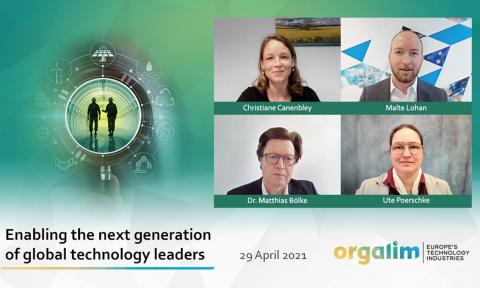Europe’s technology leadership: a defining moment
30 April 2021

What does it mean to say that we want to have global technology leadership? Can Europe even realistically expect to have it and, if so, in which areas? And, crucially, what role will the European policy framework have to play?
At this defining moment for European industry, on the eve of the new Industrial Strategy, Orgalim's latest roundtable in its Industrial Strategy in Focus series got to the heart of these questions in the course of an insightful discussion between key stakeholders from policy and industry, moderated by Orgalim’s Director-General, Malte Lohan.
With the release of the updated Industrial Strategy delayed further, to 5 May, all eyes were on Christiane Canenbley, Deputy Head of Cabinet for European Commission Executive Vice-President Margrethe Vestager, for any fresh insights into what is coming next week. And her message certainly contained reassurances for industry as she stressed that one of the big lessons from the last year that is being taken into account in this strategy update is how important it is that the Single Market works and is implemented properly. There is a big emphasis, she said, on "first of all, getting the innovation up and running, and also then really following up with the investment we need."
"What we've seen, in the last year, is the innovative capacity of industry, and also of certain businesses, to adapt immediately and to change the business model, within a few weeks and months. This is wonderful. This is really great to see, and there's no need for us to intervene then. And so it's also about getting the balance right, where we really need to intervene, where do we invest and also where we'd better leave the markets to find the best solution and also really to use the huge innovative potential we have in Europe." - Christiane Canenbley
It's about getting the balance right, where we really need to intervene, where do we invest and also where we'd better leave the markets to find the best solution and also really to use the huge innovative potential we have in Europe.
The second part of the panel discussion took a deeper dive into the obstacles and opportunities to ensure Europe's technology leadership going forward, from the perspective of two European technology leaders: one large and one SME.
Both identified the need to speed up and support deployment of technologies that are largely available already on the shelf. "As an SME, you deploy what you need and what you can afford. But it can be difficult to choose for yourself and to implement – a lot of companies need more support and more information to pick what is already available on the market," said Ute Poerschke, ZVEI board member and Managing Partner of Elschukom, which makes ultra-thin wires.
Both also emphasised the importance of avoiding unnecessary regulatory burden, while expressing support for high standards of sustainability. Dr. Matthias Bölke, Vice President Strategy Industrial Automation, Schneider Electric, and Chairman of the recently formed Industrial Digital Twin Association, highlighted the potential of digital twins to accelerate transformation and leverage the value in the huge amounts of complex industrial data being generated. "But let's not then over-complicate regulations on data and trade of data here in Europe because this would then be a disadvantage," he said.
"The smart manufacturing sector is a super successful sector in Europe, that is now going into this transition of digitalisation, and I think the industry is able to do it. Just don't over-regulate and don't bring the speed down, but bring it up, and bring it up by more supporting collaboration, across companies and across technologies." - Dr. Matthias Bölke
We're really facing a once-in-a-generation opportunity for Europe in the weeks and months ahead to reclaim leadership as a technology superpower in the fields that will matter tomorrow.
Topical polls punctuated and informed the discussion as well as questions from an audience which included several senior policy-makers and industry players.
Don't miss our next event in the series, on Fragmentation: Europe's cybersecurity challenge – register here.
If you missed this debate, you can watch a replay of the session below or by clicking here.

LATEST NEWS
How can we create a dynamic, competitive European high-tech manufacturing base?
Orgalim's key recommendations offer policymake...
